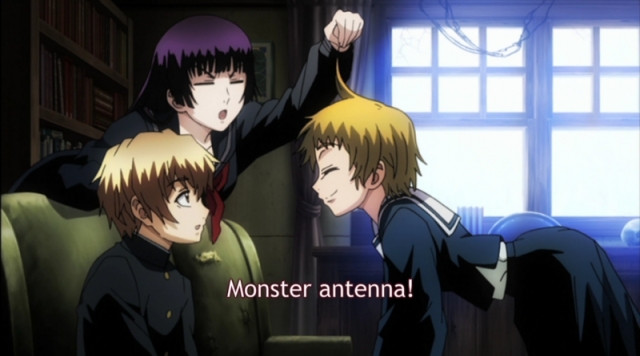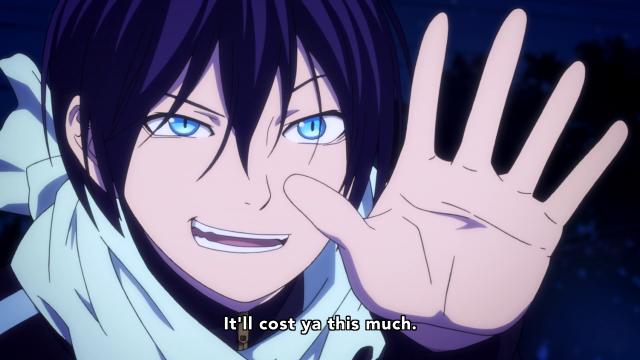One of the things which I admire about anime is that when one feels like one has seen the same plot a million times over, the same characters ten million times, and the same school classrooms a hundred million times over, a show will surface to blow one’s expectations and remind one why anime was so appealing in the first place. This little one season show, Dusk Maiden of Amnesia, stands head and shoulders above most anime for the profundity of its message. I feel an eternal debt of gratitude toward Marlin-sama of Ashita no Anime for intriguing me enough to pick it up. Among its themes, the refusal of its heroine to acknowledge her dark past and believing that she should be loved less if the hero discovered it reminds me of the folly of pride which believers can enmesh themselves in relation to God.

Dusk Maiden of Amnesia has an interesting portrayal of pride in the mind of Yuuko, the ghost for whom Niiya, the protagonist, falls in love. She has a light side which has expunged all the memories of suffering, bitterness, and hatred which she suffered in her past, and a dark side which remembers only these painful moments and can only feel these negative emotions. This split is so complete that they appear as different persons. We, dear readers, similarly have darkness and light within us; but most of us, however much we may minimize this darkness, never fall into that greatest temptation of pride: to cast off this dark side from our consciousness and to distort reality to the extent that we consider ourselves angels.

But, Yuuko does have more of an excuse than most of us. After all, she was sacrificed by superstitious pagans so that an epidemic might cease. (Perhaps superstitious is an unneeded modifier. Can one truly be a pagan without being superstitious? Oh, well. That’s a question for another blogger.) Nor was this a quick death: she was left to die alone of suffocation or of starvation in pitch blackness while suffering the agony of a broken leg at around 15 or 16 years of age. All of this while thoughts of envy toward her best friend and hatred toward those who abandoned her there swirled in her mind. That’s a memory I’m sure most of us would desire effaced!

Yet, we are not walking according to the truth if we disown our suffering, evil thoughts, and dark deeds. And do we not own our dark side more truly than than our good side? After all, we cannot maintain the least virtue, perform a single good deed, or have one good thought apart from God, who aids us by His own divine life. On the other hand, we can do all sorts of sins on our own and would even plummet into utter vileness if not prevented by His grace. St. Philip Neri once remarked as he saw a condemned man passing him on the road: “There goes Philip Neri but for the grace of God.” Nor is this arrangement unfair: how many sins have I myself committed despite receiving the grace to will otherwise? How many times have I consented to sin without lifting up a single prayer so that I might will good instead of evil? Or did pray, but never wanted to form the wholehearted will to shun what might be more delightful to the senses or sweeter to my ego?

At any rate, Yuuko further compounds her darkness by believing that Niiya won’t love her if she has any darkness or suffering in her. This is not true: we are all loved by the people in our lives in spite of our defects. How much more ought we trust that God loves us in spite of our wickedness? As believers love to repeat, God’s love is unconditional. Even in the midst of mortal sin by which we deserve to be sent straight to hell, God does not cease loving us and strives to turn us to repentance. Yet, I believe people growing in goodness are more susceptible to this form of pride than outright sinners. Somehow, the delusion intrudes that God loves us because of our good deeds rather than simply because He made us and thought it delightful that we should be with Him in paradise forever. Then, we start forgetting our wicked deeds or minimizing them under the delusion that God somehow loves us more infinitely for being good!

Yuuko’s desire to forget her painful past becomes so extreme that she further effaces her memories of Niiya. You see, Niiya had absorbed the dark side’s, Shadow Yuuko’s, terrible memories and Yuuko cannot help reliving them when she touches Niiya. Therefore, she blocks Niiya’s presence from her vision. Even though she strongly desires to see him again and stays in the same vicinity as him, she cannot see him. At last, the only way that they can communicate is by writing notes to each other in a notebook.

Is this not rather like a Christian who in his mad drive to forget the memory of his sins even avoids the sight of a crucifix? I think it no accident that in one episode we see two images of a cross: one made by Niiya and Kanoe’s shadows crossing and the other one of light. For, the cross is painful because we see our sins in the wounds of Christ, but these very wounds bring us in the light of Christ’s presence. And Niiya and Yuuko exchanging notes is rather like how a Christian soul, when frustrated at not feeling God’s presence, will turn to the Scriptures–all the while yearning for the embrace of the One who loves her.

Then, that beautiful scene occurs in their club’s room, the Paranormal Investigation Club. Niiya takes a bat and begins shattering everything in the room in order to get Yuuko’s attention. Furthermore, his actions bring Shadow Yuuko into focus for Yuuko at the same time. This is reminiscent of St. Augustine’s Confessions:
You called and cried out loud and shattered my deafness. You were radiant and resplendent, you put to flight my blindness. You were fragrant, and I drew in my breath and now pant after you. I tasted you, and I feel but hunger and thirst for you. You touched me, and I am set on fire to attain the peace which is yours.

In this scene, we find that Niiya wishes especially to speak to Shadow Yuuko and embraces her, saying that he loves Shadow Yuuko too, because Yuuko and Shadow Yuuko are the same person. In the same way, though Jesus hates the least speck of sin in our souls, He loves us entire. He wishes to love us in pain as well as in joy, which is so plainly figured in the cross as Jesus endures all the pain caused by pain and suffering in our lives out of pure love for us. The confession of love by Niiya allows for both halves of Yuuko to come together, forming Yuuko into a complete person.

Since God loves us as a complete person, there is no need to attempt hiding our sinful selves from Him. Rather, let us contemplate the Crucifix in which we clearly see our sins in the holes in Christ’s hands and feet, the pierced side, the crowning of thorns, and the anguished expression on His countenance, knowing that it is through means of these wounds that we are bound to Him forever.

Speaking of forever (Big spoiler coming! If you’re the kind of person who absolutely cant’s endure them, don’t read on!), I expected Yuuko to disappear in the last episode–the natural end for ghost stories like this. And indeed, with her regrets being solved and the integrity of her person, she does disappear for a while, leaving Niiya in great sorrow. Does this not remind us of how we desire heaven, where we shall be reunited with our loved ones and love shall endure in perfection forever? It seems, however, that Niiya’s last kiss produced a new regret in Yuuko: she now desires many more kisses. Truly, love is never exhausted! Since this is a love story first and foremost, Catullus 5 powerfully comes to mind:
Let us live, my Lesbia, and let us love,
and let us judge all the rumors of the old men
to be worth just one penny!
The suns are able to fall and rise:
When that brief light has fallen for us,
we must sleep a never ending night.
Give me a thousand kisses, then another hundred,
then another thousand, then a second hundred,
then yet another thousand more, then another hundred.
Then, when we have made many thousands,
we will mix them all up so that we don’t know,
and so that no one can be jealous of us when he finds out
how many kisses we have shared.














































